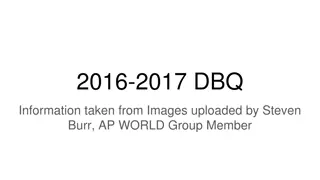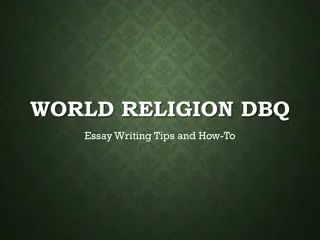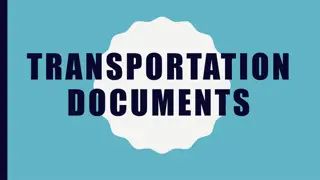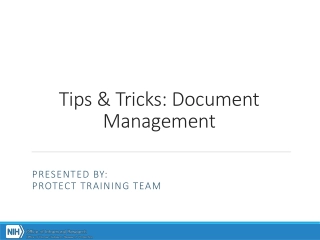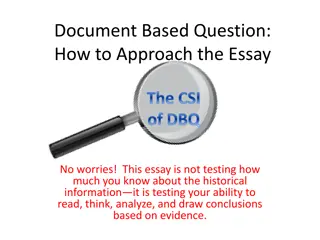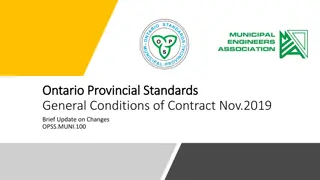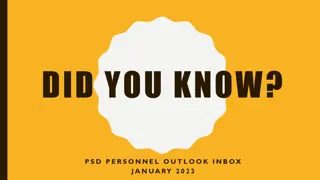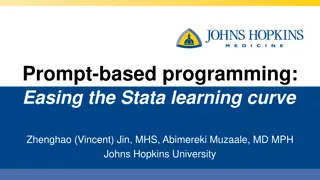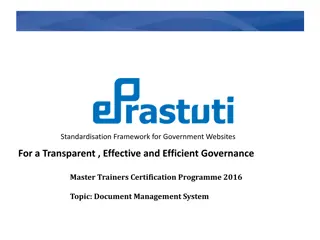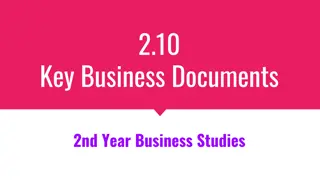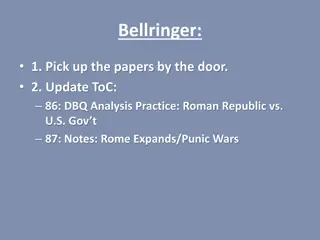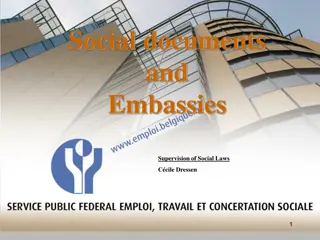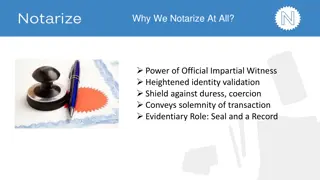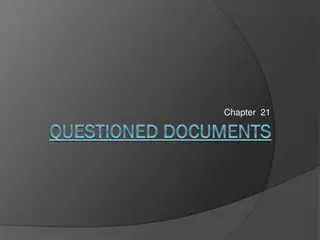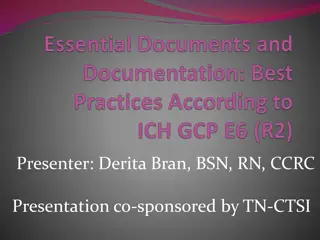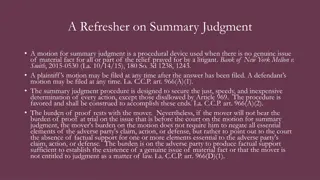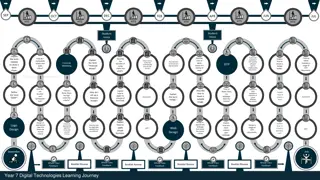Mastering the DBQ: Understanding the Prompt and Documents
Learn how to excel in the Document Based Question (DBQ) on the APUSH Exam by focusing on analyzing the prompt, handling task, limiting, and content words, and assessing the validity of historical statements. Explore the role of opposition forces in the defeat of the Treaty of Versailles, President Wilson's governing philosophy, and contrasting views on human nature and government.
Download Presentation

Please find below an Image/Link to download the presentation.
The content on the website is provided AS IS for your information and personal use only. It may not be sold, licensed, or shared on other websites without obtaining consent from the author. Download presentation by click this link. If you encounter any issues during the download, it is possible that the publisher has removed the file from their server.
E N D
Presentation Transcript
THE MECHANICS OF THE DBQ: A Focus on the Prompt & Documents
The APUSH Document Based Question There is one DBQ on the APUSH Exam. You have no choice. You will have 60 minutes during the exam to write the DBQ. [15 min prewrite + 45 min write time] The DBQ constitutes 25% of your AP score: 40% Multiple Choice 20% Short Answer Question(SAQ) 25% Document Based Question (DBQ) 15% Long Essay Question (LEQ)
Focus on the Prompt Prompt It is VITAL that you break down the prompt: What is the prompt asking you to do? Ensure that you understand the ENTIRE prompt. Are you given time period restraints. What points do you have to address? What action (VERB) are you being asked to do? Does the prompt suggest a structure for the essay?
Handle the prompt with TLC T Task Words: Tell you what to do, the action you need to perform L Limiting Words: Limit and focus the essay, making it workable C Content Words: Tell you what the topic area is and what you should write about
It was the strength of the opposition forces, both liberal and conservative, rather than the ineptitude and stubbornness of President Wilson that led to the Senate defeat of the Treaty of Versailles. Using the documents and your knowledge of the period 1917-1921, assess the validity of this statement.
Wilson, Versailles, and the League of Nations Read the 2 page APUSH Supplemental Notes Harper to discuss Wilson s Governing Philosophy. Time permitting, watch 6 min video.
Wilson as President Founding Fathers Position Human nature is unchanging. Man s ultimate motivation is self-interest. There is a permanent standard for what is right and wrong. Power of the government is a threat to individual liberty and thus must be limited. Woodrow Wilson s Position Human nature is evolving progressing. The only valid knowledge is scientifically based knowledge. Govt is no threat, and ought to be the organ of individualism. Govt is not grounded on unchanging truths, but should instead evolve to meet historical circumstances.
Wilsons Governing Philosophy *As the only nationally elected official, the president represented the national will . 1. Wilson was cynical about the separation of powers. Favored the British Parliamentary System, with a Prime Minister who was not just an executive, but the legislative leader as well 2. The separation of powers impeded genuine democracy. Thought it was inefficient and prevented government from solving the problems of modern life in a coordinated way. 3. Favored a transition from politics to administration To Wilson, experts were better suited to make policy, not elected representatives
Implies the consent of the governed. To Wilson, politics and administration must be separate. Disparages politics and moves focal point away from consent of the governed into the hands of experts and the creation of bureaucracy.
It was the strength of the opposition forces, both liberal and conservative, rather than the ineptitude and stubbornness of President Wilson that led to the Senate defeat of the Treaty of Versailles. Using the documents and your knowledge of the period 1917-1921, assess the validity of this statement.
DBQ Documents: Handle with care How would you respond if you HAD NO DOCS? The DBQ is driven by your argument and the outside information that you include. Should be called a Document Supported Question New APUSH Exam requires that you use HIPP when analyzing and incorporating documents into your DBQ.
You must be HIPP on the DBQ HHistorical Context: What is the historical context document? What s going on at the time? How does it fit into the time period? IIntended Audience: Who is the intended audience of this document? PPurpose: What is the purpose of the document? PPOV: What is the Point of View of the author?
Document A Source: William Borah, Speech in United States Senate, December 6,1918. The first proposition connected with the proposed league is that of a tribunal to settle the matters of controversy which may arise between the different nations. Will anyone advocate that those matters which are of vital importance to our people shall be submitted to a tribunal created other than by our own people and give it an international army subject to its direction and control to enforce its decrees? I doubt if anyone will advocate that. . . . If you do not do so, Mr. President, what will your league amount to? . . . In its last analysis the proposition is force to destroy force, conflict to prevent conflict, militarism to destroy militarism, war to prevent war. In its last analysis it must be that if it has any sanction behind its judgment at all. There is where the difficulty lies. . . .
Document B Source: The New Republic, May 24,1919. Liberals all over the world have hoped that a war, which was so clearly the fruit of competition and I imperialist and class-bound nationalism, would end in a peace which would moralize nationalism by releasing it from class bondage and exclusive ambitions. The Treaty of Versailles does not even try to satisfy these aspirations. Instead of expressing a great recuperative effort of the conscience of civilization, which for its own sins has sweated so much blood, it does much to intensify and nothing to heal the old and ugly dissensions.
Document C Source: Woodrow Wilson, Speech, September 5,1919. When you read Article X, therefore, you will see that it is nothing but the inevitable, logical center of the whole system of the Covenant of the League of Nations, and I stand for it absolutely. If it should ever in any important respect be impaired, I would feel like asking the Secretary of War to get the boys who went across the water to fight, . . . and I would stand up before them and say, Boys, I told you before you went across the seas that this was a war against wars, and I did my best to fulfill the promise, but I am obliged to come to you in mortification and shame and say I have not been able to fulfill the promise. You are betrayed. You have fought for something that you did not get.
Document D I Source: Herbert Hoover to Woodrow Wilson, November 19,1919. I take the liberty of urging upon you the desirability of accepting the reservations now passed. . . . I have the belief that with the League once in motion it can within itself and from experience and public education develop such measures as will make it effective. I am impressed with the desperate necessity of early ratification. The delays have already seriously imperiled the economic recuperation of Europe. In this we are vitally interested from every point of view. I believe that the Covenant will steadily lose ground in popular support if it is not put into constructive operation at once because the American public will not appreciate the saving values of the Covenant as distinguished from the wrongs imposed in the Treaty. . . .
Document F Source: John Maynard Keynes, Economic Consequences of the Peace, 1920. According to [the French] vision of the future, European history is to be a perpetual prize-fight, of which France has won this round, but of which this round is certainly not the last. . . . For Clemenceau made no pretense of considering himself bound by the Fourteen Points and left chiefly to others such concoctions as were necessary from time to time to save the scruples or the face of the President [Wilson]. . . . . The policy of reducing Germany to servitude for a generation, of degrading the lives of millions of human beings, and of depriving a whole nation of happiness should be abhorrent and detestable,-abhorrent and detestable, even if it were possible, even if it enriched ourselves, even if it did not sow the decay of the whole civilized life of Europe.
Document G I Source: Woodrow Wilson, "Appeal to the Country," October 3,1920. This election is to be a genuine national referendum. . . . The chief question that is put to you is, of course: Do you want your, country's honor vindicated and the Treaty of Versailles ratified? Do you in particular approve of the League of Nations as organized and empowered in that treaty? And do you wish to see the United States play its responsible part in it? . . . [The founders of the Government] thought of America as the light of the world as created to lead the world in the assertion of the rights of peoples and the rights of free nations. . . . This light the opponents of the League would quench.
Document H Source: W.E.B. Du Bois, "The League of Nations," Crisis, March, 1921. Forty-one nations, including nearly every Negro and mulatto and colored government of the world, have met in Geneva and formed the assembly of the League of Nations. This is the most forward looking event of the century. Because of the idiotic way in which the stubbornness of Woodrow ' Wilson and the political fortunes of the Republicans became involved, the United States was not represented. But despite its tumult and shouting this nation must joiri and join on the terms which the World lays down. The idea that we single- handed can dictate terms to the World or stay out of the World, is an idea born of the folly of fools.
Document I Source: Jane Addams, Peace and Bread in time of War, 1922. The League of Nations afforded a wide difference of opinion in every group. The Woman's Peace Party held its annual meeting in Chicago in the spring of 1920 and found our Branches fairly divided upon the subject. . . . The difference of opinion was limited always as to the existing League and never for a moment did anyone doubt the need for continued effort to bring about an adequate international organization.
ARTICLE 10. The Members of the League undertake to respect and preserve as against external aggression the territorial integrity and existing political independence of all Members of the League. In case of any such aggression or in case of any threat or danger of such aggression the Council shall advise upon the means by which this obligation shall be fulfilled.
ARTICLE 16. Should any Member of the League resort to war in disregard of its covenants under Articles 12, 13 or 15, it shall ipso facto be deemed to have committed an act of war against all other Members of the League, which hereby undertake immediately to subject it to the severance of all trade or financial relations, the prohibition of all intercourse between their nationals and the nationals of the covenant-breaking State, and the prevention of all financial, commercial or personal intercourse between the nationals of the covenant-breaking State and the nationals of any other State, whether a Member of the League or not. It shall be the duty of the Council in such case to recommend to the several Governments concerned what effective military, naval or air force the Members of the League shall severally contribute to the armed forces to be used to protect the covenants of the League. The Members of the League agree, further, that they will mutually support one another in the financial and economic measures which are taken under this Article, in order to minimize the loss and inconvenience resulting from the above measures, and that they will mutually support one another in resisting any special measures aimed at one of their number by the covenant-breaking State, and that they will take the necessary steps to afford passage through their territory to the forces of any of the Members of the League which are co-operating to protect the covenants of the League.


